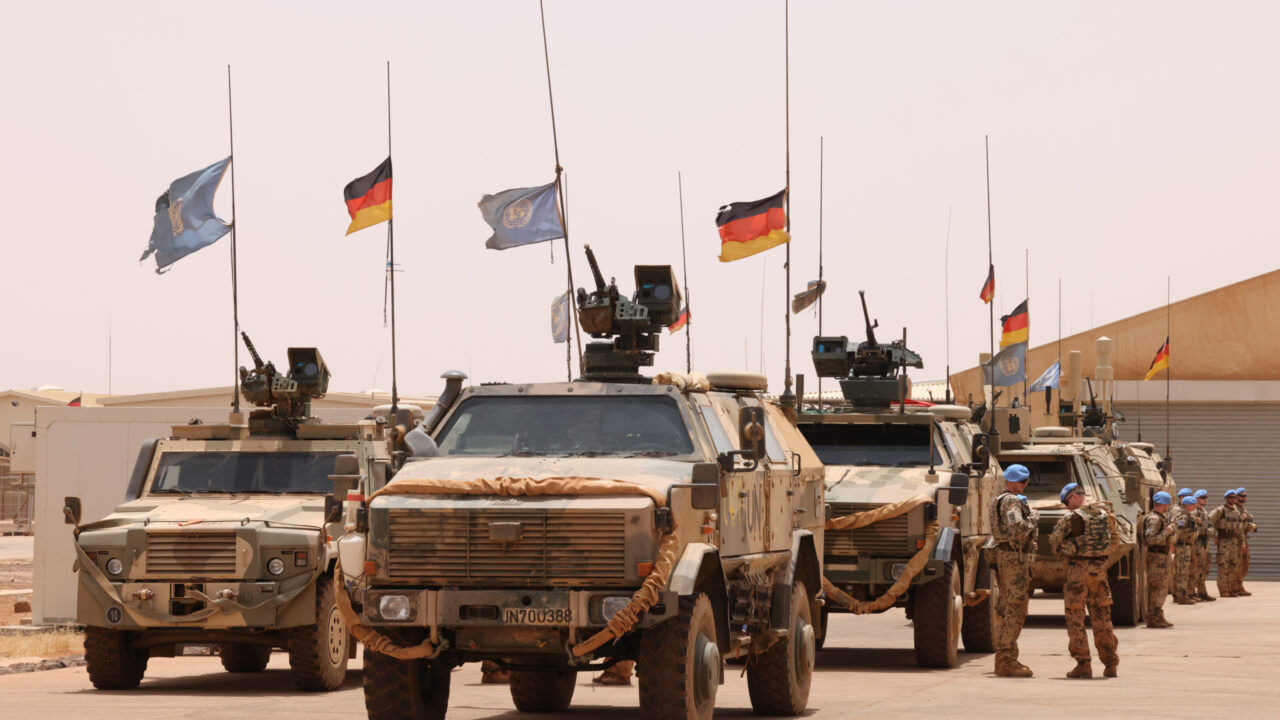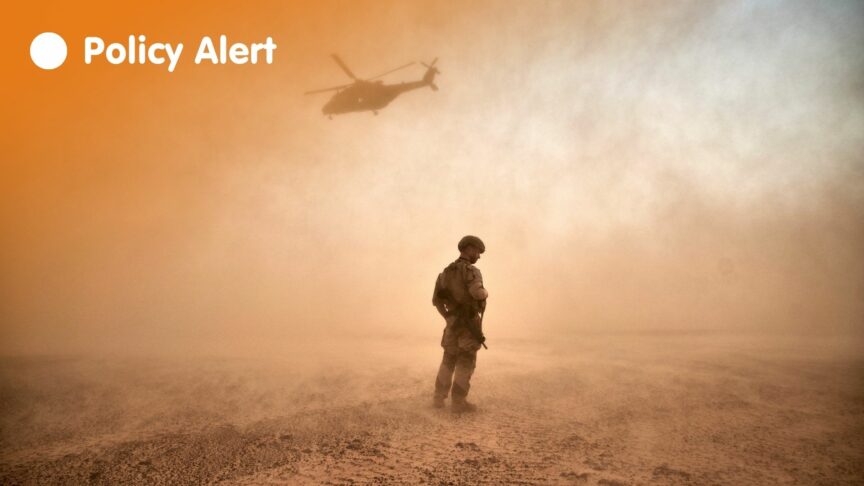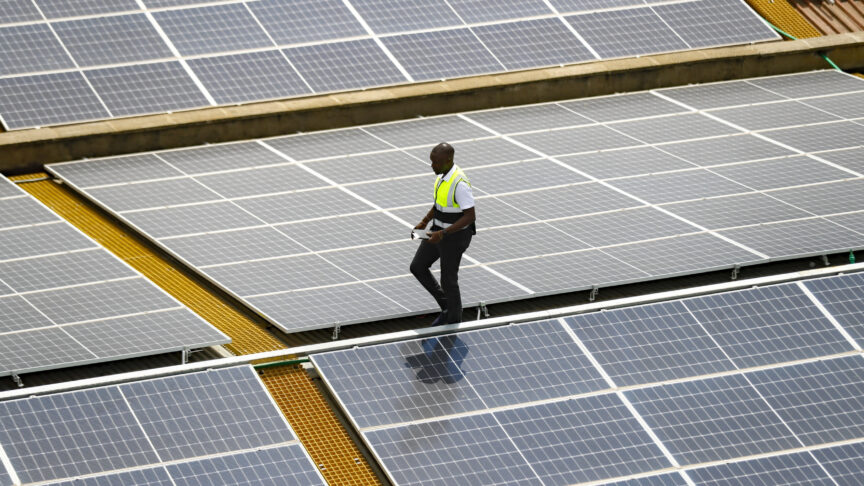Lone changer: Germany, Mali, and Russian influence in Africa’s arc of instability
Russia is exploiting weaknesses in Europe’s relationships with states across Africa. Germany will need to set a precedent in Mali if it is to respond to this challenge effectively
Russia’s intervention in Mali has created a dilemma for Germany. It has emboldened the Malian junta to confront Germany and made a European exit from Mali seem to signify a defeat by Russia. Moscow may not have planned this from the start, but the situation is now playing out much to its advantage. The Kremlin is on track to kill two birds with one stone: encouraging Bamako to overplay its hand by ending Europe’s involvement in Mali, and gaining a monopoly on foreign influence in the resulting vacuum.
One can now discern a pattern in Russia’s many engagements in Africa’s arc of instability since 2017. Where Europe undertakes stabilisation and peacekeeping operations in Africa, Russia exploits the friction between Europe and host governments over differences in approach. Where Europe emphasises values, a rules-based approach, and cautious measures to safeguard its own forces, Russia picks one side and offers support with no strings attached.
Russia’s entry into Malian politics has been akin to the impact of an invasive species on a new ecosystem: altering the environment to make it inhospitable for its long-standing inhabitants – in this case, European stabilisation and peacekeeping support. In 2017 the Kremlin had a similar effect in the Central African Republic (CAR), where it exploited the government’s dissatisfaction with UN efforts to counter the rebellion in the country and Europeans’ hectoring over governance failures. Like Mali, the CAR was once a redoubt of French influence. As Russian military involvement in the CAR deepened, Europe was forced to cut its aid to the country out of fear that EU taxpayers would subsidise that process. Russia then surged into the vacuum, consolidating its influence in the CAR unopposed. The dire situation in the CAR since is a sign of what lies ahead for Mali. Russian support for Sudan plays on a similar divide – abetting autocrats shunned by Europe – and has reduced the chances that democracy will take root in the country, Europe’s principal objective there.
Russia’s entry into Malian politics has been akin to the impact of an invasive species on a new ecosystem
Berlin now has a decisive role in Mali, given that Paris recently withdrew the last remaining French troops from the country. Germany’s choice of whether and how to maintain a presence there is shaping European military support for the United Nations Multidimensional Integrated Stabilisation Mission in Mali (MINUSMA). In May 2022, the Bundestag extended the mandate of its bilateral engagement with Mali but refocused it on support for MINUSMA. Once Germany cast its lot with the mission, other European states followed suit. Should Germany end this support, other European states will head for the exit as well.
The trap Germany finds itself in comes from the Malian junta’s bruising dispute with France in the last year. France’s condemnation of the junta’s power grab and its embrace of Russia’s role eventually resulted in the expulsion of the French ambassador to Mali. While the junta directed its hostility chiefly against Paris, the dispute also bled into Bamako’s relationships with other European capitals – which needed to show solidarity with France.
The junta has now begun to use its control over entry into Mali as a means of hectoring Europe. Bamako is not yet willing to reject Europe and MINSUMA outright but has become increasingly assertive – by disrupting logistics support for the mission in needling, bureaucratic ways. The junta’s recent decision to block a German troop rotation flight follows a similar move against another contingent of MINUSMA soldiers (from Cote D’Ivoire), as well as its intervention to stop German troops from boarding a civilian flight in Bamako in July.
Moscow is pivotal in this behaviour because its backing emboldens Bamako. No longer dependent solely on Europe’s military support, the junta feels empowered to confront Europe. But Mali’s and Russia’s deeper strategic interests diverge. Logically, Mali should maximise its options by keeping both Russia and Europe engaged, while playing them off against each other to maximise the benefits it gains. Russia has different interests: it seeks to goad the junta into provoking Europeans to withdraw from Mali.
Before it faced this difficult situation, Europe only aimed to prevent terrorism and the expansion of jihadist groups, protect civilians, and help MINUSMA keep the Malian peace process on life support (however unpopular that may be). The equation changed after Russia entered Mali and the junta turned against first France and then seemingly Europe. Europe’s new objectives revolve around what it could no longer do if it left Mali: stand by Malians despite the difficulty of dealing with their current government; uphold multilateralism as a principal by maintaining MINUSMA; avoid the full withdrawal of European forces (because, once they left, domestic political concerns would make it challenging for them to return); and, most importantly, avoid ceding Mali to Russia entirely.
But the Kremlin has put them in a bind: remaining in Mali is increasingly difficult. However, departure seems to mean accepting defeat. This explains the Bundestag’s decision in May. By ending its direct engagement with Mali while keeping a foothold in the country via MINUSMA, Germany elected to hunker down and wait for something to change. Presumably, the hope is that the Russians will hang themselves if given enough rope – by, for example, abusing the Malians that they are ostensibly protecting or exploiting Mali’s resources in a way that engenders a popular backlash – and that, under the junta or another government, Europe will end up in Bamako’s good graces once again.
Operationally, this strategy has required Europe to pause its bilateral missions and focus its active military support on MINSUMA. This is borne out by efforts to repurpose the European Union Training Mission in Mali to focus on Niger, and to shift Germany’s formal role in that mission to the provision of military advice. One virtue of the strategy is that it reduces the risk of overlap between European and Russian military operations. But, critically, it does not entirely remove the leverage over European military logistics that Bamako has used to inconvenience Europe so effectively. The need to provide military support to MINUSMA is now Europe’s Achilles heel in Mali.
When the German government re-evaluated its activities in Mali earlier this year, the pitfalls were apparent but it seemed to be unsettled by the prospect of dramatically changing its approach to the country. This made a limited adjustment attractive at first glance. Nonetheless, the situation has become untenable.
Europe’s options
Europe is planning to conduct even more stabilisation and peacekeeping operations in the arc of instability, expanding across the Sahel towards the Atlantic. At the same time, one should expect Russia to continue exploiting divides to force Europeans out of various African countries. So, what Europe does in Mali has consequences beyond its borders: it will set a precedent for existing and future missions. Therefore, Europeans should craft their policy on Mali with a view to establishing a new pattern of behaviour across the region as well as in the country itself.
The only iron-clad guarantee of European influence comes from the host country denying Russia access in the first place. However, Europe may be unable to achieve this without beginning a race to the bottom against Russia, abandoning its values to offer unconditional military support to authoritarian leaders. While Europe’s support may come with strings attached, it is qualitatively and quantitively superior to Russia’s. Accordingly, for African states, there is a real cost to losing European support. But Europe may need to demonstrate its readiness to walk away before they are willing to recognise the consequences of this. Seen that way, Europe may have to sacrifice its presence in Mali for the sake of regional stability.
This article was first published in German on Der Tagesspiegel
The European Council on Foreign Relations does not take collective positions. ECFR publications only represent the views of their individual authors.



